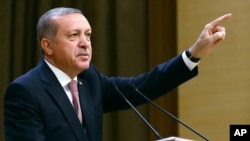U.S. officials Tuesday responded dispassionately to accusations made by an angry Turkish leader, who last month survived a coup attempt, that “the West is supporting terror and standing by the coup plotters.”
President Recep Tayyip Erdogan “is certainly free to express his views and his frustrations as he sees fit,” said State Department spokesman John Kirby.
Erdogan reiterated in a televised address earlier Tuesday that “actors inside acted out a scenario for a coup written from the outside," and those whom Turkey "imagined to be friends are standing by the coup plotters and by the terrorists."
The State Department spokesman insisted that despite Erdogan’s increasingly provocative comments, “what matters is the partnership with Turkey is going forward.”
Erdogan, in his speech, directly called on the United States to extradite a former imam who the Turkish president alleges was the mastermind behind the plot to overthrow the democratically elected government.
“What kind of strategic partners are we, that you can still host someone whose extradition I have asked for?" Erdogan asked.
Imam denies link
Fetullah Gulen, a 75-year-old Erdogan rival who has lived in self-imposed exile in the United States for nearly two decades, has denied any connection to the uprising.
Turkish officials, meanwhile, say they have sent a second set of documents to the U.S. government detailing why it is urgent to arrest Gulen, whom Ankara regards as leading a terrorist organization.
U.S. officials will not directly comment on the requests from Turkey, stating only that documentation has been received and is being analyzed, but no judgment has apparently been made on whether there has been a formal extradition request, as Ankara insists it has submitted.
“I don’t want to set an expectation up that we’re going to be able to give you a blow-by-blow of the process as it works its way through,” Kirby told reporters.
The Turkish president lashed out at Washington and the country’s other NATO allies a day after the chairman of the Joint Chiefs of Staff, U.S. Marine Corps General Joseph Dunford, met with Turkish Prime Minister Binali Yildirim — an encounter designed to try to narrow the rift that has developed since the July 15 coup attempt.
Purge follows coup bid
The violent attempted overthrow by elements of Turkey’s military, which fired on unarmed civilians, left more than 230 people dead.
The Turkish government has subsequently been purging tens of thousands of perceived internal enemies under a state of emergency enacted after the coup.
Erdogan defends his crackdown as necessary to prevent Gulen supporters from attempting another coup.
A group of Turkish lawmakers is visiting Washington and New York City this week to press for Gulen’s extradition.
“We would like to see America take some serious steps” against Gulen and, while mulling Turkey’s extradition request, “put him in custody or prevent his activities" on U.S. soil, Kamil Aydin, a lawmaker from the right-wing Nationalist Movement Party, told VOA on Monday.
He and three other Turkish lawmakers have been meeting U.S. officials at the Justice Department, the Department of Homeland Security and the State Department.
Numerous observers of Turkey characterize the country as torn between two Islamic movements — one led by an increasingly authoritarian Erdogan, who is criticized as weakening the rule of law and governing institutions, and the other by the enigmatic Gulen, who lives in virtual isolation in a sprawling rural American compound.
Gulen was previously put on trial in absentia in Turkey in 2000 and acquitted in 2008.





